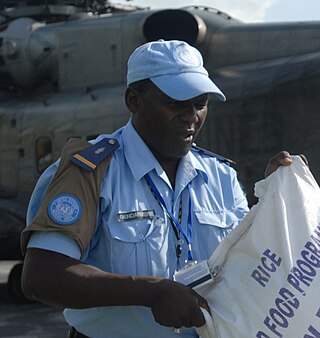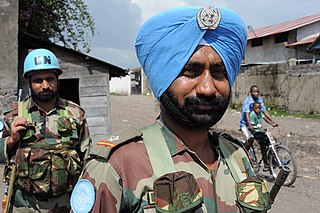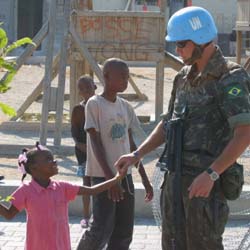
The United Nations Organization Stabilization Mission in the Democratic Republic of the Congo, or MONUSCO, is a United Nations peacekeeping force in the Democratic Republic of the Congo (DRC). A planned withdrawal from the country is currently on indefinite hold due to the unstable security situation.

The United Nations Stabilisation Mission in Haiti, also known as MINUSTAH, an acronym of its French name, was a UN peacekeeping mission in Haiti from 2004 to 2017. It was composed of 2,366 military personnel and 2,533 police, supported by international civilian personnel, a local civilian staff, and United Nations Volunteers. The mission's military component was led by the Brazilian Army and commanded by a Brazilian.

The United Nations Mission in Liberia (UNMIL) was a United Nations peacekeeping operation established in September 2003 to monitor a ceasefire agreement in Liberia following the resignation of President Charles Taylor and the conclusion of the Second Liberian Civil War (1999–2003). At its peak it consisted of up to 15,000 UN military personnel and 1,115 police officers, along with civilian political advisors and aid workers.

The African Union-United Nations Hybrid Operation in Darfur was a joint African Union (AU) and United Nations (UN) peacekeeping mission formally approved by United Nations Security Council Resolution 1769 on 31 July 2007, to bring stability to the war-torn Darfur region of Sudan while peace talks on a final settlement continue.

United Nations Security Council Resolution 1908, adopted unanimously on January 19, 2010, after endorsing the Secretary-General's recommendation, the Council increased the size of the United Nations Stabilization Mission in Haiti (MINUSTAH) established under Resolution 1542 (2004), in the aftermath of the 2010 Haiti earthquake. The resolution authorised an additional 3,500 peacekeepers for Haiti, bringing the total number of MINUSTAH troops to 8,940 and a police component to 3,711.

United Nations Security Council Resolution 1542, adopted unanimously on 30 April 2004, after receiving a report by the Secretary-General Kofi Annan, the council deplored all violations of human rights in Haiti and urged the Government of Haiti to promote and protect human rights with a State based on rule of law and independent judiciary.

United Nations Security Council resolution 867, adopted unanimously on 23 September 1993, after recalling resolutions 841 (1993), 861 (1993) and 862 (1993) on the situation in Haiti, the council reiterated its position of protecting international peace and stability and established the United Nations Mission in Haiti (UNMIH).

United Nations Security Council resolution 933, adopted unanimously on 30 June 1994, after recalling resolutions 841 (1993), 861 (1993), 862 (1993), 867 (1993), 873 (1993), 875 (1993), 905 (1994) and 917 (1994), the Council noted the deteriorating situation in Haiti and extended the mandate of the United Nations Mission in Haiti (UNMIH) until 31 July 1994.

United Nations Security Council resolution 1063, adopted unanimously on 28 June 1996, after recalling all Security Council and General Assembly resolutions on Haiti and the termination of the United Nations Mission in Haiti (UNMIH) on 30 June 1996 in accordance with Resolution 1048 (1996), the Council decided to establish the United Nations Support Mission in Haiti (UNSMIH) to train a national police force and maintain a stable environment.

United Nations Security Council Resolution 1925, adopted unanimously on May 28, 2010, after reaffirming previous resolutions on the situation in the Democratic Republic of the Congo, the Council extended the mandate of the United Nations Mission in the Democratic Republic of Congo (MONUC) until June 30, 2010, authorised a withdrawal of 2,000 troops and decided that from July 1, 2010, MONUC would be known as the United Nations Organization Stabilization Mission in the Democratic Republic of the Congo (MONUSCO) with a mandate until June 30, 2011.

United Nations Security Council Resolution 1927, adopted unanimously on June 4, 2010, after recalling previous resolutions on Haiti, including resolutions 1542 (2004), 1576 (2004), 1608 (2005), 1658 (2006), 1702 (2006), 1743 (2006), 1780 (2007), 1840 (2008), 1892 (2009) and 1908 (2010), the Council authorised an additional deployment of 680 police as part of the United Nations Stabilization Mission in Haiti (MINUSTAH).

United Nations Security Council Resolution 1944, adopted unanimously on October 14, 2010, after recalling previous resolutions on Haiti, including resolutions 1542 (2004), 1576 (2004), 1608 (2005), 1658 (2006), 1702 (2006), 1743 (2006), 1780 (2007), 1840 (2008), 1892 (2009), 1908 (2010) and 1927 (2010), the Council renewed the mandate of the United Nations Stabilization Mission in Haiti (MINUSTAH) until October 15, 2011.

United Nations Security Council Resolution 1608, adopted unanimously on 22 June 2005, after recalling resolutions 1542 (2004) and 1576 (2004) on the situation in Haiti, the Council extended the mandate of the United Nations Stabilisation Mission in Haiti (MINUSTAH) until 15 February 2006 and increased its strength.
United Nations Security Council Resolution 1777 was unanimously adopted on 20 September 2007.

United Nations Security Council Resolution 1780 was unanimously adopted on 15 October 2007.
United Nations Security Council Resolution 1892 was unanimously adopted on 13 October 2009.
United Nations Security Council Resolution 1885 was unanimously adopted on 15 September 2009.
United Nations Security Council Resolution 1836 was unanimously adopted on 29 September 2008.
United Nations Security Council Resolution 1840 was unanimously adopted on 14 October 2008.
United Nations Security Council Resolution 1843 was unanimously adopted on 20 November 2008.











